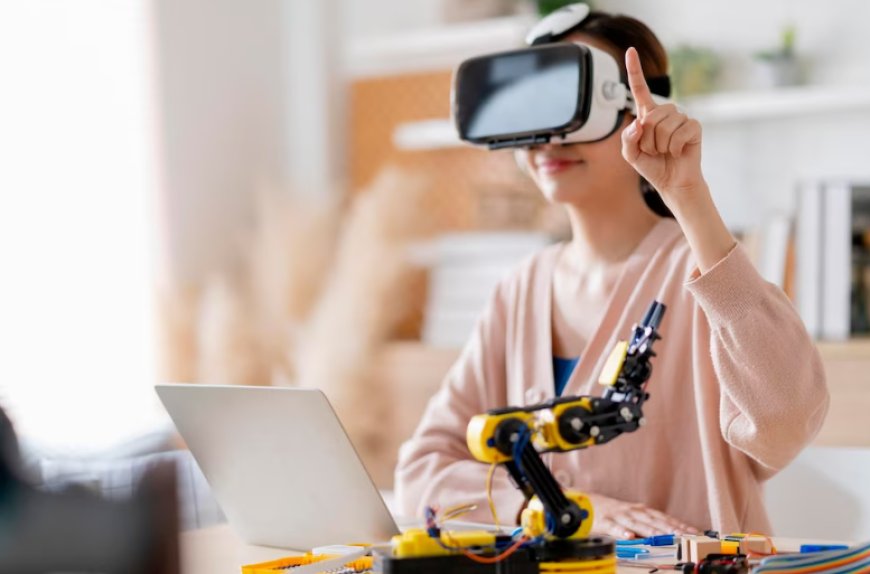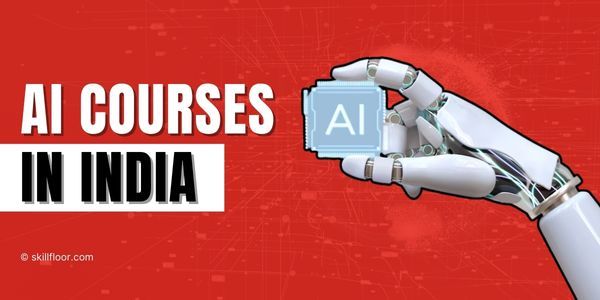The Intersection of Robotics and AI Innovation
The Power of Robotics and Artificial Intelligence: On a New Era of Innovation and Boundless Possibilities

Robots have long captured our imagination with their ability to perform tasks and interact with the world around us. In recent years, the field of robotics has witnessed significant advancements, thanks to the integration of Artificial Intelligence (AI). This powerful combination of Robotics and AI has given rise to a new era of possibilities, paving the way for groundbreaking innovations and revolutionizing various industries. In this blog, we will delve into the fascinating world of Robotics in Artificial Intelligence, exploring its applications, benefits, and the future it holds.
Understanding Robotics and Artificial Intelligence:
Before we dive into the realm of Robotics in AI, let's first understand the fundamental concepts of Robotics and Artificial Intelligence.
Robotics: Robotics is a multidisciplinary field that involves the design, development, and implementation of robots. Robots are physical machines or mechanical devices programmed to perform specific tasks autonomously or under human control. They can interact with their environment through sensors, actuators, and sophisticated algorithms.
Artificial Intelligence: Artificial Intelligence, commonly known as AI, is the branch of computer science that focuses on creating intelligent machines capable of performing tasks that typically require human intelligence. AI encompasses various techniques such as machine learning, natural language processing, computer vision, and more
The Intersection of Robotics and Artificial Intelligence :
The integration of Robotics and Artificial Intelligence has unlocked a wide range of possibilities. By combining the physical capabilities of robots with the intelligence of AI algorithms, we can create machines that can perceive, learn, reason, and make decisions in real-world environments. Let's explore some of the exciting applications and benefits of
Robotics in AI: Automation and Industry 4.0: Robotics in AI has revolutionized industries by automating repetitive and labor-intensive tasks. Robots equipped with AI algorithms can perform intricate tasks with precision, speed, and efficiency. This has significantly impacted manufacturing, logistics, healthcare, and other sectors, leading to increased productivity, reduced costs, and improved safety.
Assistive Robotics: Robotics in AI has the potential to enhance the quality of life for individuals with disabilities or age-related limitations. Intelligent robots can assist in activities of daily living, provide companionship, and even support healthcare professionals in patient care.
Autonomous Vehicles: The development of autonomous vehicles is a prime example of Robotics in AI. Self-driving cars utilize AI algorithms to perceive their surroundings, make decisions, and navigate safely. This technology holds the promise of reducing accidents, enhancing transportation efficiency, and revolutionizing the way we travel.
Intelligent Healthcare: Robotics in AI has made significant strides in the healthcare sector. Robots can assist in surgeries, automate medication management, and provide support in patient monitoring and rehabilitation. AI algorithms enable robots to analyze medical data, identify patterns, and aid in diagnosis and treatment.
Exploration and Space Missions: Robotics in AI has enabled us to explore environments that are hazardous or inaccessible to humans. Robots equipped with AI algorithms can navigate challenging terrains, conduct scientific research, and aid in space missions. They can assist in gathering data, performing repairs, and supporting astronauts in extraterrestrial environments.
The Future of Robotics in Artificial Intelligence :
The future of Robotics in AI is bright and holds tremendous potential. As technology continues to advance, we can expect to witness even more remarkable developments. Here are some areas to watch out for:
Human-Robot Collaboration: The future of Robotics in AI lies in seamless collaboration between humans and robots. We can anticipate more advanced robots that can understand human intentions, work alongside humans in shared spaces, and adapt to dynamic environments.
Swarm Robotics: Swarm robotics involves the coordination of large groups of robots to work together towards a common goal. The integration of AI algorithms allows these robots to communicate, cooperate, and collectively solve complex problems. Swarm robotics has applications in disaster response, agriculture, and surveillance.
Ethical and Responsible AI: As robots become more intelligent and autonomous, ethical considerations become paramount. The future of Robotics in AI will focus on ensuring that these technologies are developed and deployed responsibly, with proper safeguards to prevent misuse or harm.
Intelligent Personal Assistants: With advancements in natural language processing and machine learning, we can anticipate more intelligent personal assistants. These AI-powered robots will understand and respond to human commands, assist with daily tasks, and provide personalized recommendations and services.
Emotional Intelligence in Robots: Researchers are exploring ways to imbue robots with emotional intelligence, enabling them to recognize and respond to human emotions. This would enhance human-robot interaction and enable robots to provide emotional support and companionship.
Embrace the Future of Robotics in Artificial Intelligence :
As we look to the future, the potential of Robotics in AI is limitless. Human-robot collaboration, swarm robotics, ethical and responsible AI, intelligent personal assistants, and emotional intelligence in robots are just a glimpse of what lies ahead.
To fully embrace the future of Robotics in AI, it is essential to nurture curiosity, innovation, and collaboration. Researchers, engineers, and policymakers must work together to address ethical concerns, develop robust safety measures, and ensure the responsible deployment of these technologies.
Enhanced Security: With the advancements in Robotics in AI, there is also a growing focus on enhancing cybersecurity. As robots become more interconnected and integrated into various systems, ensuring their security becomes crucial. Cybersecurity measures will need to be implemented to protect robots from potential hacking and malicious activities, safeguarding sensitive data and preventing unauthorized access.
Personalized Robotics: As AI algorithms continue to evolve, robots will become more capable of understanding individual preferences and adapting to specific needs. Personalized robotics will enable robots to provide tailored services and assistance, catering to the unique requirements of each user. This can range from customized healthcare support to personalized household management, making robots valuable companions in our daily lives.
Collaborative Workforce: The future of Robotics in AI also envisions a collaborative workforce where humans and robots work together harmoniously. Robots will take on repetitive, physically demanding, and hazardous tasks, allowing humans to focus on more complex and creative endeavors. This collaboration will augment human capabilities, increasing overall productivity and efficiency in various industries.
Education and Research: Robotics in AI will play a vital role in advancing education and research. Intelligent robots can be used as educational tools, assisting teachers in classrooms and providing interactive learning experiences for students. They can also support researchers in conducting experiments, collecting data, and accelerating the pace of scientific discoveries.
Ethical Considerations: As Robotics in AI becomes more prevalent, ethical considerations will become increasingly important. Questions about privacy, transparency, accountability, and the impact on employment need to be addressed. The development and implementation of ethical guidelines and regulations will ensure that Robotics in AI is used responsibly and for the benefit of humanity.
To Summarize, Robotics in Artificial Intelligence holds immense potential to revolutionize various industries and transform our daily lives.The integration of AI algorithms and robotics technology enables robots to perform complex tasks, adapt to changing environments, and interact with humans more effectively. The future of Robotics in AI promises increased automation, improved efficiency, enhanced safety, and personalized experiences.As robots become more intelligent and autonomous, they will play a significant role in healthcare, manufacturing, transportation, and many other sectors. They will assist in repetitive and hazardous tasks, collaborate with humans in workplaces, and contribute to increased productivity and efficiency. Additionally, robots will have the ability to provide personalized services, such as healthcare assistance and household management, catering to individual needs and preferences.



























































